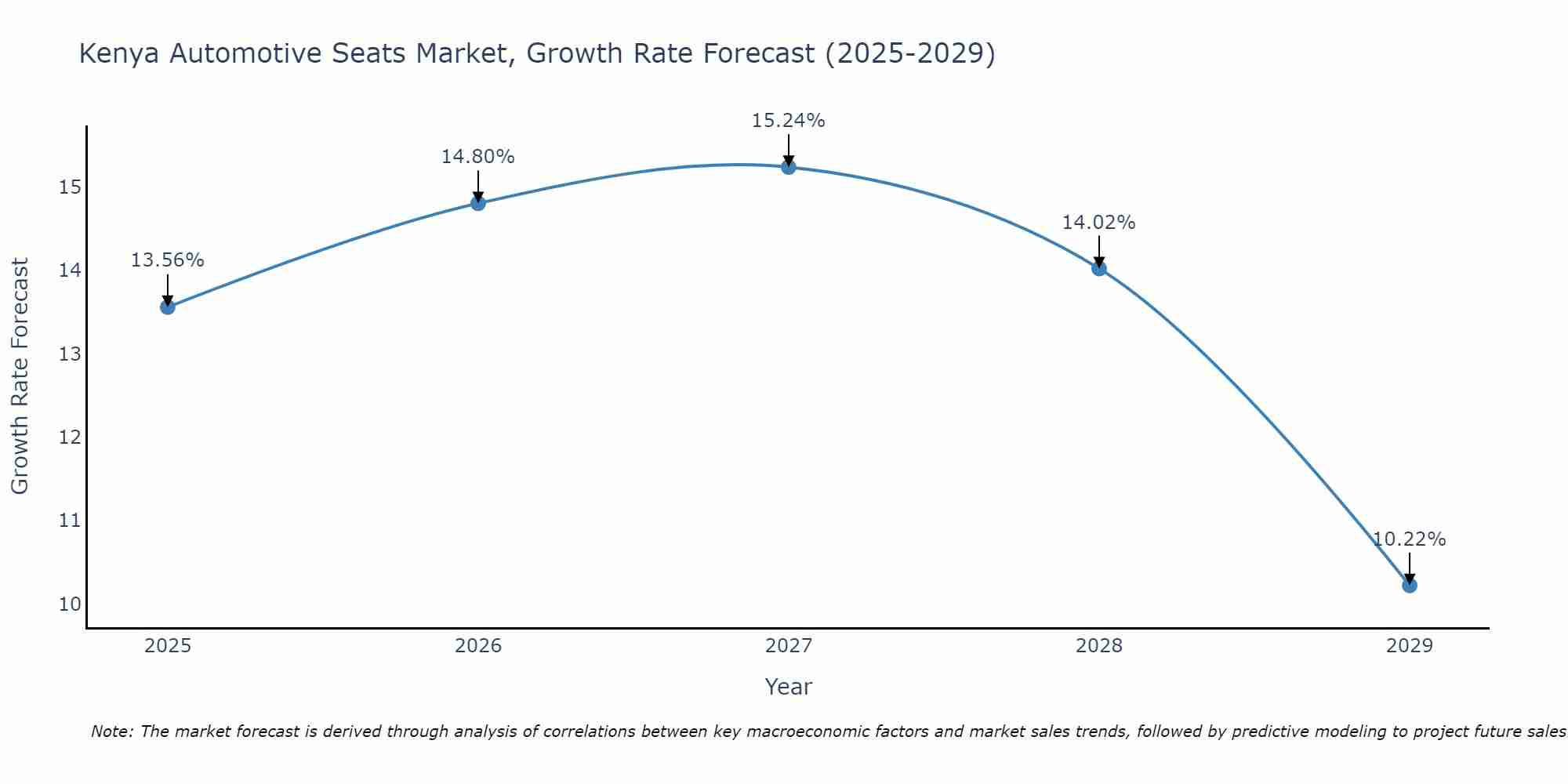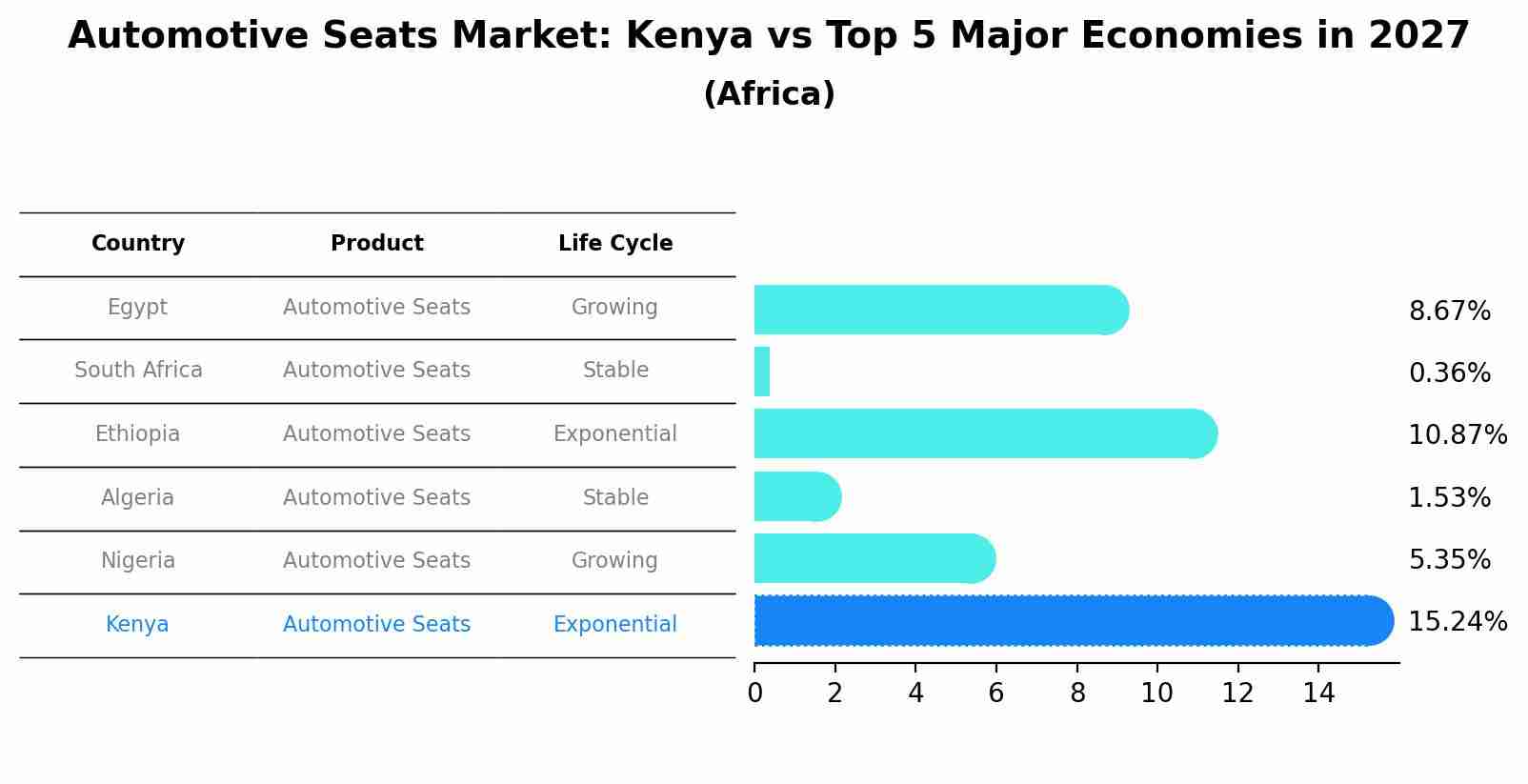Kenya Automotive Seats Market Outlook | Industry, Trends, Companies, Share, Growth, Value, COVID-19 IMPACT, Forecast, Size, Analysis & Revenue
| Product Code: ETC370850 | Publication Date: Aug 2022 | Updated Date: Jul 2025 | Product Type: Market Research Report | |
| Publisher: 6Wresearch | Author: Dhaval Chaurasia | No. of Pages: 75 | No. of Figures: 35 | No. of Tables: 20 |
Kenya Automotive Seats Market Size Growth Rate
The Kenya Automotive Seats Market is projected to witness mixed growth rate patterns during 2025 to 2029. Growth accelerates to 15.24% in 2027, following an initial rate of 13.56%, before easing to 10.22% at the end of the period.

Automotive Seats Market: Kenya vs Top 5 Major Economies in 2027 (Africa)
The Automotive Seats market in Kenya is projected to grow at a exponential growth rate of 15.24% by 2027, highlighting the country's increasing focus on advanced technologies within the Africa region, where Egypt holds the dominant position, followed closely by South Africa, Ethiopia, Algeria and Nigeria, shaping overall regional demand.

Kenya Automotive Seats Market Synopsis
The Kenya Automotive Seats Market is experiencing steady growth driven by increasing vehicle sales, rising disposable income, and a growing middle-class population. The market is characterized by a mix of local and international automotive seat manufacturers catering to both OEMs and aftermarket segments. Key players such as Toyota Tsusho Corporation, Lear Corporation, and Faurecia dominate the market with a wide range of products including fabric, leather, and synthetic materials. The demand for comfortable, ergonomic, and technologically advanced seats in vehicles is on the rise, leading to innovations in seat design and materials. With the government`s focus on improving road infrastructure and promoting vehicle manufacturing, the Kenya Automotive Seats Market is poised for further expansion in the coming years.
Kenya Automotive Seats Market Trends
The Kenya Automotive Seats Market is experiencing a shift towards more advanced and comfortable seating options, driven by increasing consumer demand for enhanced driving experiences. There is a growing preference for seats with ergonomic designs, premium materials, and advanced features such as heating, ventilation, and massage functions. Automakers and seat manufacturers are also focusing on lightweight materials and sustainable practices to improve fuel efficiency and reduce environmental impact. Additionally, safety features such as integrated airbags and adjustable headrests are becoming standard requirements in the market. Overall, the Kenya Automotive Seats Market is witnessing a trend towards innovation, comfort, and safety to meet the evolving needs and preferences of consumers.
Kenya Automotive Seats Market Challenges
In the Kenya Automotive Seats Market, challenges such as high import duties on automotive components and raw materials, limited local manufacturing capacity leading to a significant reliance on imports, and the presence of counterfeit products impacting the market credibility are prevalent. Additionally, fluctuations in currency exchange rates, inadequate infrastructure affecting distribution networks, and the lack of skilled labor for advanced manufacturing processes pose hurdles for the market growth. Moreover, the competitive landscape with both local and international players vying for market share further intensifies the challenges faced by companies operating in the Kenya Automotive Seats Market. Addressing these challenges will require strategic partnerships, investments in local manufacturing capabilities, and stringent quality control measures to ensure sustainable growth in the market.
Kenya Automotive Seats Market Investment Opportunities
The Kenya Automotive Seats Market presents lucrative investment opportunities due to the country`s growing automotive industry and increasing demand for vehicles. With a rising middle-class population and improved purchasing power, there is a growing market for comfortable and high-quality automotive seats. Investors can explore opportunities in manufacturing and supplying a wide range of automotive seats, including luxury seats, sports seats, and ergonomic designs to cater to different customer preferences. Additionally, investing in research and development to incorporate advanced technologies such as heated seats, massage functions, and smart seating systems can provide a competitive edge in the market. Collaborating with local automobile manufacturers and dealerships can also help in establishing a strong presence and distribution network in the Kenyan automotive sector.
Jordan Agar Market Government Policies
The Kenya automotive seats market is primarily influenced by government policies aimed at promoting local manufacturing and investment in the automotive industry. The Kenyan government has implemented measures such as tariff reductions on automotive parts and components to encourage local assembly of vehicles, which in turn drives the demand for automotive seats. Additionally, the government has introduced incentives and tax breaks for automotive manufacturers to set up production facilities in the country, further boosting the automotive seats market. Regulatory standards and safety requirements for automotive seats are also enforced by the government to ensure compliance with international quality standards and consumer safety. Overall, government policies in Kenya play a crucial role in shaping the automotive seats market by incentivizing local production and ensuring quality standards are met.
Kenya Automotive Seats Market Future Outlook
The Kenya Automotive Seats Market is poised for significant growth in the coming years due to various factors such as the increasing demand for vehicles, rising disposable income, and improving road infrastructure in the country. With a growing middle-class population and a shift towards more comfortable and luxurious vehicles, there is a rising preference for high-quality automotive seats. Additionally, government initiatives to promote the automotive industry and attract foreign investments are expected to drive market growth. The market is also witnessing a trend towards lightweight and eco-friendly materials in automotive seat manufacturing. Overall, the Kenya Automotive Seats Market is expected to experience steady expansion, offering opportunities for both domestic and international automotive seat manufacturers to capitalize on the growing demand in the region.
Key Highlights of the Report:
- Kenya Automotive Seats Market Outlook
- Market Size of Kenya Automotive Seats Market, 2021
- Forecast of Kenya Automotive Seats Market, 2031
- Historical Data and Forecast of Kenya Automotive Seats Revenues & Volume for the Period 2018 - 2031
- Kenya Automotive Seats Market Trend Evolution
- Kenya Automotive Seats Market Drivers and Challenges
- Kenya Automotive Seats Price Trends
- Kenya Automotive Seats Porter's Five Forces
- Kenya Automotive Seats Industry Life Cycle
- Historical Data and Forecast of Kenya Automotive Seats Market Revenues & Volume By Material Type for the Period 2018 - 2031
- Historical Data and Forecast of Kenya Automotive Seats Market Revenues & Volume By Synthetic for the Period 2018 - 2031
- Historical Data and Forecast of Kenya Automotive Seats Market Revenues & Volume By Genuine Leather for the Period 2018 - 2031
- Historical Data and Forecast of Kenya Automotive Seats Market Revenues & Volume By Fabric for the Period 2018 - 2031
- Historical Data and Forecast of Kenya Automotive Seats Market Revenues & Volume By Other for the Period 2018 - 2031
- Historical Data and Forecast of Kenya Automotive Seats Market Revenues & Volume By Technology for the Period 2018 - 2031
- Historical Data and Forecast of Kenya Automotive Seats Market Revenues & Volume By Standard Seats for the Period 2018 - 2031
- Historical Data and Forecast of Kenya Automotive Seats Market Revenues & Volume By Powered Seats for the Period 2018 - 2031
- Historical Data and Forecast of Kenya Automotive Seats Market Revenues & Volume By Ventilated Seats for the Period 2018 - 2031
- Historical Data and Forecast of Kenya Automotive Seats Market Revenues & Volume By Other Seats for the Period 2018 - 2031
- Kenya Automotive Seats Import Export Trade Statistics
- Market Opportunity Assessment By Material Type
- Market Opportunity Assessment By Technology
- Kenya Automotive Seats Top Companies Market Share
- Kenya Automotive Seats Competitive Benchmarking By Technical and Operational Parameters
- Kenya Automotive Seats Company Profiles
- Kenya Automotive Seats Key Strategic Recommendations
Frequently Asked Questions About the Market Study (FAQs):
- Single User License$ 1,995
- Department License$ 2,400
- Site License$ 3,120
- Global License$ 3,795
Search
Thought Leadership and Analyst Meet
Our Clients
Related Reports
- Canada Oil and Gas Market (2026-2032) | Share, Segmentation, Value, Industry, Trends, Forecast, Analysis, Size & Revenue, Growth, Competitive Landscape, Outlook, Companies
- Germany Breakfast Food Market (2026-2032) | Industry, Share, Growth, Size, Companies, Value, Analysis, Revenue, Trends, Forecast & Outlook
- Australia Briquette Market (2025-2031) | Growth, Size, Revenue, Forecast, Analysis, Trends, Value, Share, Industry & Companies
- Vietnam System Integrator Market (2025-2031) | Size, Companies, Analysis, Industry, Value, Forecast, Growth, Trends, Revenue & Share
- ASEAN and Thailand Brain Health Supplements Market (2025-2031) | Strategy, Consumer Insights, Analysis, Investment Trends, Opportunities, Growth, Size, Share, Industry, Revenue, Segments, Value, Segmentation, Supply, Forecast, Restraints, Outlook, Competition, Drivers, Trends, Demand, Pricing Analysis, Competitive, Strategic Insights, Companies, Challenges
- ASEAN Bearings Market (2025-2031) | Strategy, Consumer Insights, Analysis, Investment Trends, Opportunities, Growth, Size, Share, Industry, Revenue, Segments, Value, Segmentation, Supply, Forecast, Restraints, Outlook, Competition, Drivers, Trends, Demand, Pricing Analysis, Competitive, Strategic Insights, Companies, Challenges
- Europe Flooring Market (2025-2031) | Outlook, Share, Industry, Trends, Forecast, Companies, Revenue, Size, Analysis, Growth & Value
- Saudi Arabia Manlift Market (2025-2031) | Outlook, Size, Growth, Trends, Companies, Industry, Revenue, Value, Share, Forecast & Analysis
- Uganda Excavator, Crane, and Wheel Loaders Market (2025-2031) | Strategy, Consumer Insights, Analysis, Investment Trends, Opportunities, Growth, Size, Share, Industry, Revenue, Segments, Value, Segmentation, Supply, Forecast, Restraints, Outlook, Competition, Drivers, Trends, Demand, Pricing Analysis, Competitive, Strategic Insights, Companies, Challenges
- Rwanda Excavator, Crane, and Wheel Loaders Market (2025-2031) | Strategy, Consumer Insights, Analysis, Investment Trends, Opportunities, Growth, Size, Share, Industry, Revenue, Segments, Value, Segmentation, Supply, Forecast, Restraints, Outlook, Competition, Drivers, Trends, Demand, Pricing Analysis, Competitive, Strategic Insights, Companies, Challenges
Industry Events and Analyst Meet
Whitepaper
- Middle East & Africa Commercial Security Market Click here to view more.
- Middle East & Africa Fire Safety Systems & Equipment Market Click here to view more.
- GCC Drone Market Click here to view more.
- Middle East Lighting Fixture Market Click here to view more.
- GCC Physical & Perimeter Security Market Click here to view more.
6WResearch In News
- Doha a strategic location for EV manufacturing hub: IPA Qatar
- Demand for luxury TVs surging in the GCC, says Samsung
- Empowering Growth: The Thriving Journey of Bangladesh’s Cable Industry
- Demand for luxury TVs surging in the GCC, says Samsung
- Video call with a traditional healer? Once unthinkable, it’s now common in South Africa
- Intelligent Buildings To Smooth GCC’s Path To Net Zero


















